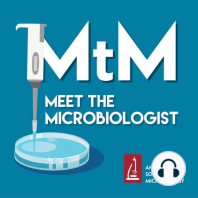24 min listen

MTS50 - R. Ford Denison - Darwin on the Farm
MTS50 - R. Ford Denison - Darwin on the Farm
ratings:
Length:
39 minutes
Released:
May 19, 2010
Format:
Podcast episode
Description
In this podcast, I talk to R. Ford Denison of the University of Minnesota. Denison is an evolutionary biologist who's interested in how to make agriculture better. The ways in which plants thrive or fail are shaped by their evolutionary history, as well as the evolution that unfolds every planting season.
We're most familiar with the evolution of resistance to pesticides in insects and to herbicides in weeds. But evolution has many other effects on farms. For example, many important crop plants, like soybeans, cannot extract nitrogen from the atmosphere on their own. They depend instead on bacteria that live inside their roots.
In exchange for fixed nitrogen, the bacteria get nutrients from the plants. It may seem like a happy case of cooperation, but the evolution of cooperation always runs the risk of cheating and deception. How plants and bacteria come to a compromise is a remarkable story that Denison and his colleagues are now documenting.
Selected Publications
Denison, R.F. 2010. Darwinian agriculture: where does nature's wisdom lie? Book in preparation for Princeton University Press.
Ratcliff, W.C., P. Hawthorne, M. Travisano, R.F. Denison. 2009. When stress predicts a shrinking gene pool, trading early reproduction for longevity can increase fitness, even with lower fecundity. PLoS One 4:e6055
Kiers E. T., R.A. Rousseau, S. A. West, and R. F. Denison. 2003. Host sanctions and the legume-rhizobium mutualism. Nature 425:78-81.
We're most familiar with the evolution of resistance to pesticides in insects and to herbicides in weeds. But evolution has many other effects on farms. For example, many important crop plants, like soybeans, cannot extract nitrogen from the atmosphere on their own. They depend instead on bacteria that live inside their roots.
In exchange for fixed nitrogen, the bacteria get nutrients from the plants. It may seem like a happy case of cooperation, but the evolution of cooperation always runs the risk of cheating and deception. How plants and bacteria come to a compromise is a remarkable story that Denison and his colleagues are now documenting.
Selected Publications
Denison, R.F. 2010. Darwinian agriculture: where does nature's wisdom lie? Book in preparation for Princeton University Press.
Ratcliff, W.C., P. Hawthorne, M. Travisano, R.F. Denison. 2009. When stress predicts a shrinking gene pool, trading early reproduction for longevity can increase fitness, even with lower fecundity. PLoS One 4:e6055
Kiers E. T., R.A. Rousseau, S. A. West, and R. F. Denison. 2003. Host sanctions and the legume-rhizobium mutualism. Nature 425:78-81.
Released:
May 19, 2010
Format:
Podcast episode
Titles in the series (100)
MTS6 Bruce Rittmann - Microbes, Waste and Renewable Energy by Meet the Microbiologist